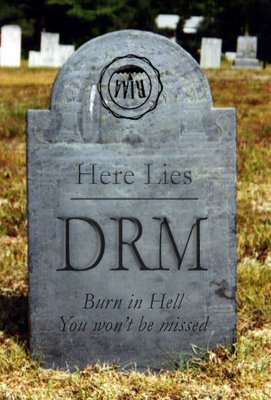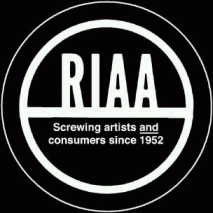
You hear that bell ringing in the distance? That’s the sound of DRM dying.
What is DRM and why is it dying? Well, DRM is the collection of anti-copying technologies that record companies and movie companies use to try and prevent their products from ending up on the P2P networks (like Limewire and eDonkey). DRM stands for either Digital Rights Management or Digital Restrictions Management, depending on who you ask (I say the latter).
It is my considered opinion that DRM sucks donkey balls. It impedes fair use and generally creates havoc. Files were meant to be copied, but DRM tries to erase this feature. DRM is even built into Windows Vista in an attempt to make DRM more effective since earlier designs have failed miserably.
That brings us to Apple and EMI. Their announcement today is the first crack in the industry facade. Previously, the industry titans were aligned and spoke in unison of DRM’s necessity. Now it has become clear that many in the industry recognize that DRM is a failure, a waste of money and (this doesn’t seem to matter to the RIAA) virulently anti-consumer.
Steve Jobs started things off with his broadside against DRM. He said:
Imagine a world where every online store sells DRM-free music encoded in open licensable formats. In such a world, any player can play music purchased from any store, and any store can sell music which is playable on all players. This is clearly the best alternative for consumers, and Apple would embrace it in a heartbeat. If the big four music companies would license Apple their music without the requirement that it be protected with a DRM, we would switch to selling only DRM-free music on our iTunes store. Every iPod ever made will play this DRM-free music.
Right now an iPod can’t play music purchased from Microsoft’s stores, just as a Zune can’t play music purchased from Apple’s iTunes store. This is a ridiculous state of affairs since both companies went out of their way to make their songs incompatible — at the RIAA’s request. Every MP3 player can play unprotected MP3s, but once you start putting DRM on those songs it gets really sticky.
That’s why DRM must die. The only thing keeping our portable music players from being able to play any song out there is simple human greed. The technology is there, but new technology was erected to prevent sharing. Worst of all, it didn’t work. Every major DRM-scheme has been broken. Geeks like myself know how to avoid and circumvent it, but the average user probably doesn’t know what the hell DRM is — until it smacks’em in the face. This lamentable reality took a body-blow today.
EMI agreed to sell DRM-free music this morning, with Apple at their side. This is not an ideal scenario since the songs cost $1.29 instead of the customary 99 cents, but Apple sweetened the deal by bumping up the bitrate to 256 kbps — double the previous amount — granting audiophiles the extra sound quality they need. Many of the tricks to eliminate DRM (including simply burning the files to CD and re-ripping them) result in reduced sound quality. This solution manages to fix both problems and should satisfy most geek/audiophiles.
In short, today’s announcement was a long time coming (some may argue that it’s 4 or 5 years overdue), and it is just the beginning of DRM’s death. Even as I celebrate DRM’s passing new anti-consumer technologies are being developed by the MPAA and others in the music industry. Indeed, the 3 other major labels are still heavily invested in DRM and committed to using it as a bulwark against the internet age.
So maybe I’m digging DRM’s grave while it’s still on the operating table, but I’m not the only one who wishes it would go away. We can’t sit down and start slacking now. We need to keep letting these huge companies know that they can’t control our content after they sell it to us. They want to have their cake and eat it, too — and that just ain’t happening.
Burn in hell, DRM!
 Filed Under :
Filed Under :  Apr.16,2009
Apr.16,2009 This post currently has
4 screeches.
This post currently has
4 screeches.


